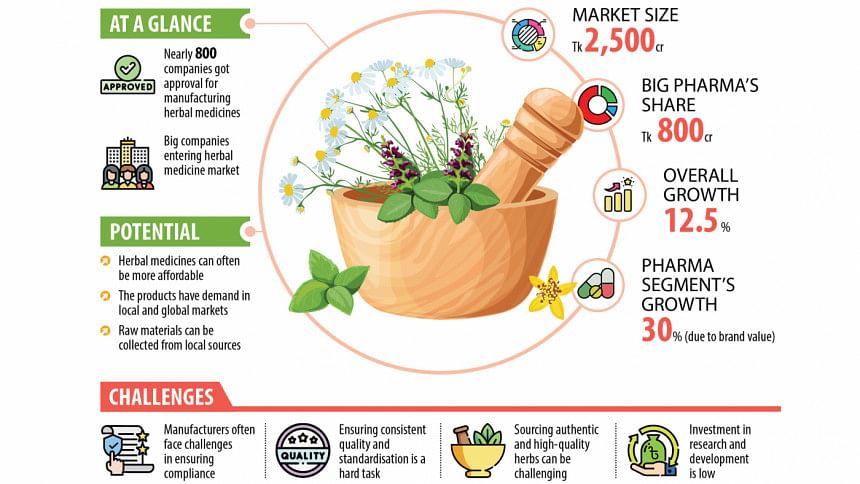Big pharmas taking hold of herbal medicine market

Big pharmaceutical companies in Bangladesh are gradually taking hold of the country's growing market for herbal medicines as people are opting for higher quality natural remedies with recognisable brand value.
The demand for herbal medicine is expanding fast as they have no side effects and are clinically proven to be effective in treating various ailments, according to industry insiders.
And although there is no reliable data, the market for herbal medicine generates annual revenue of about Tk 2,500 crore, which is one-tenth of that earned by the overall pharmaceutical sector, they said.
At present, leading drug makers such as Square, Beximco, Incepta and Acme cater to 30 percent of the country's demand for herbal medicine, earning them a combined Tk 800 crore each year.
Habibur Rahman, general manager of marketing at Incepta Pharmaceuticals, said the demand for herbal medicine of pharmaceutical companies has been growing by 30 percent annually for the past decade.
Rahman pointed out that a major benefit of producing herbal medicine is that all the required raw materials can be sourced locally.
And while the number of herbal medicines provided by pharmaceutical companies may be low, the demand is high as customers are more trusting of the natural remedies offered by renowned brands.
This is because like allopathic drugs, all types of herbal medicines require clearance from the Directorate General of Drug Administration (DGDA) before being launched in the local market, he added.
M Mohibuz Zaman, managing director of ACI Healthcare, said the effectiveness of herbal medicine has been proven across the globe, especially in countries like the US, Japan, China and India.
As such, numerous pharmaceutical companies are setting up dedicated research and development centres to create new formulas from the industry's once traditional past.
"We have plans to soon set up a separate plant for herbal medicine," he said.
"People are gradually becoming more accepting of herbal medicine, which is why pharmaceutical companies are now investing in the segment," Zaman added.
Md Hasibur Rahman, additional deputy managing director of Acme Laboratories, said the herbal medicines of pharmaceutical companies are getting popular due to their brand value and superior product quality.
"We follow the formulas of western herbal medicines and use technology to ensure quality," he added.
Hasibur believes Bangladesh has huge potential in the herbal medicine market at home and abroad as many natural remedies are now globally recognised.
Sayeed Ahmed Siddiqui, president of the Bangladesh Unani Aushad Shilpa Samity, an association of herbal medicine makers, said annual sales of herbal medicine hit a record high of Tk 1,000 crore in 2010.
Overall, the market has grown by about 12 percent annually during the past 12 years, he added.
According to him, both Ayurvedic and Unani medicines are types of herbal medicines made of all-natural materials.
Siddiqui, also managing director of Neptune Laboratories, said there are at least 320 Unani medicine manufacturers in the country while around 220 others produce Ayurvedic remedies.
Unani medicine is a type of Perso-Arabic traditional medicine practised in Muslim culture while Ayurvedic treatments have their roots in the Indian subcontinent.
Siddiqui said big pharmaceutical companies are becoming increasingly interested in producing herbal medicine considering the sizeable market for such products.
However, traditional producers are unable to keep up in the competition as they often lack access to bank finance even if licences are granted by the DGDA, he added.
Rajib Singha, managing director of Sree Kundeswari Aushadhalya Ltd, a Chattogram-based herbal medicine producer, said the market for natural remedies is growing as people are becoming more health conscious.
"For this reason, people are seeking natural and holistic approaches to maintain their health and prevent disease, contributing to the popularity of herbal medicines," he added.
Singha also said herbal medicines were often perceived as safer alternatives to conventional pharmaceuticals as they are derived from natural sources.
Md Ayub Hossain, the preceding additional director general of the DGDA, said so far around 800 companies have taken permission to manufacture herbal medicines.
According to him, the DGDA is cooperative in developing the herbal medicine sector as it is a globally recognised and a fruitful industry.
However, he said big pharmaceuticals companies are gradually grabbing up the market for herbal medicine, leaving little space for traditional producers to survive.

 For all latest news, follow The Daily Star's Google News channel.
For all latest news, follow The Daily Star's Google News channel. 




Comments